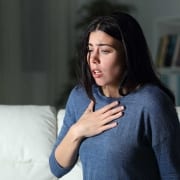Anxiety: Symptoms, Diagnosis and Treatment Options
Anxiety is loosely defined as an emotion that is characterized by feelings of tension and worried thoughts. Family, finances, health or relationships are all things that we experience anxiety over. This is normal. However, anxiety that starts to overwhelm an individual or affects how they live their day to day life can be harmful.
At the Kaplan Center, we think about anxiety a little bit differently. A growing body of research suggests that it might not be a mental disorder in and of itself, but rather a symptom of physical inflammation stemming from the brain. Celiac disease, an unhealthy diet or thyroid disease are just a few conditions that may be related to anxiety. By recognizing these connections, we are able to take a broader approach to diagnosing and treating anxiety.
Symptoms of anxiety
It is important to separate the normal anxiety that we all experience from a more serious anxiety disorder. Some of the following are things to look for:
- Worry and fear that are constant and overwhelming.
- Responding to certain events or situations with extreme fear or dread. This may be accompanied by physical signs of anxiety such as a pounding heart, trembling and sweating.
- Anxiety that interferes with your day-to-day activities or stops you from carrying out routine tasks.
- Edginess and restlessness.
- Difficulty falling or staying asleep.
Diagnosis of anxiety
The diagnosis of anxiety is one that should be made by a healthcare professional. At the Kaplan Center, we recognize that the causes of anxiety revolve around an individual’s thoughts, emotions, and feelings. In almost all instances, diagnosing anxiety does not require any invasive medical tests.
Our doctors take the time to speak to patients about these issues and allow them to discuss their anxiety as they experience it. To help diagnose anxiety we’ll ask you a few questions about:
- Past medical history
- Family history
- Medication history
- Social history
Treating anxiety
The under-recognition and under-treatment of anxiety is a widespread problem. Because anxiety can have physical symptoms, it makes the treatment somewhat challenging for traditional medicine to deal with.
At the Kaplan Center, after diagnosing anxiety our goal is to offer treatments that help address the root causes of the condition. Therefore, we offer a wide range of treatment options tailored to each individual. This may include:
- Counseling
- Sleep evaluation and management
- Heartmath-HRV
- Acupuncture
- Meditation
- Prescription medication
- Niagen IV therapy
We work with patients to create a personalized treatment plan that’s suited to their needs.
In many cases, anxiety is not a single-treatment condition. A holistic approach, such as the one we favor at the Kaplan Center allows us to look at the whole patient. We may suggest one or more of the treatments listed above or include other elements that fit your lifestyle.
We are here for you, and we want to help.
Our goal is to return you to optimal health as soon as possible. To schedule an appointment please call: 703-532-4892 x2
References:
https://www.ncbi.nlm.nih.gov/pmc/articles/PMC4610617/
https://www.apa.org/topics/anxiety/






